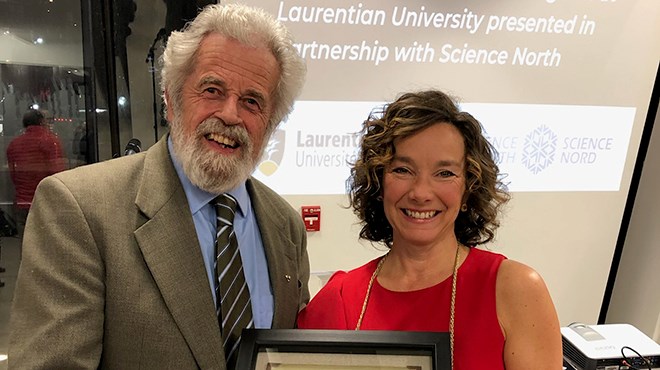Laurentian University’s Science Communication Graduate Program, offered in partnership with Science North, has been presented with the Royal Canadian Institute for Science’s William Edmond Logan Award.
Recognized nationally, the award honours excellence in promoting the public understanding of science by a Canadian organization.
The Science Communication Program provides students experiential learning opportunities for research and application of science communication principles. It offers a Master’s Degree (M.S.Com) and a Graduate Diploma (G.Dip) in Science Communication.
The William Edmond Logan Award was created in 2015 as a companion to the Fleming Medal to recognize organizations rather than individuals. Past winners include Celestica, Sanofi Pasteur Canada and IBM Canada. Together, the Fleming Medal and William Edmond Logan Award are two of a very small number of awards for outstanding science communication efforts in Canada.
“This award celebrates a unique partnership between two nationally acclaimed community institutions,” said Science North CEO Guy Labine, in a press release.
“Receiving the Logan Award reinforces the importance of the program and how its graduates can help us better understand the world of science today.”
Since its inception in 2005, the Science Communication Program has produced more than 160 graduates that have been trained to transform scientific information into accessible and understandable knowledge for the public.
The program strengthens the skills of scientists to communicate to Canadians of all ages, inspiring them to appreciate and understand the science in the world around them.
“Science North is honoured to co-deliver the program curriculum as the active ‘laboratory’ in which students practice their craft,” said Julie Moskalyk, science director at Science North.
These graduates are in high demand because of their multi-disciplinary and broad understanding of science and the need for clear communication.
“Trends in science research, industry, and public policy have prompted a need for professional science communicators in this rapidly growing field,” said Chantal Barriault, director of the Science Communication graduate program.
“Laurentian’s graduates are specialists in communicating the work of leading researchers and scientists to diverse audiences, from young children to politicians. We are incredibly honoured to receive the Logan award from the Royal Canadian Society for Science."
To learn more about the Science Communication Program, visit sciencecommunication.ca.
